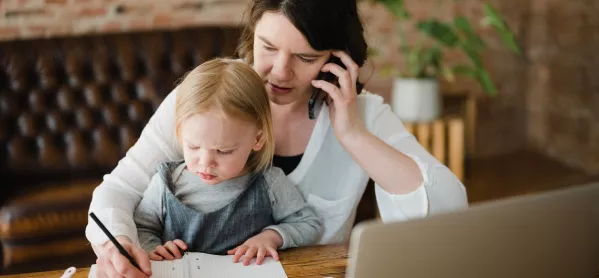Why teacher-parents need help and support right now
Share
Why teacher-parents need help and support right now
The fragile web of post-lockdown childcare. The logistics of live teaching while isolating with young families. The anxiety of unwittingly transmitting Covid-19 to children and vulnerable grandparents.
These are just some of the predominant preoccupations of teachers who are managing their parenting responsibilities with the demands of returning to (an attempt at) a socially distanced workplace.
While teachers don’t face the same risks as our colleagues in the NHS, we remain on the frontline of this pandemic. This fact is especially highlighted now that employees in other industries have once again been encouraged to work from home.
As my friends in accounting and film bemoan the isolation of only seeing their partners and kittens during the working week, I am conscious that, as a teacher, I am interacting with hundreds - sometimes thousands - of students and colleagues every day.
And, for those of us who are parents, the general concerns shared by the teaching profession are accompanied by an additional dimension of small but daily considerations revolving around our own children.
Coronavirus: The challenge for teacher-parents
Even now that childcare settings and schools have reopened fully, teachers are still being caught out by the logistics of the school day and adaptations made in response to social-distancing measures. Affordable wraparound care, previously open to all students, is now limited to year-group bubbles. In some cases, it has been cancelled altogether.
Where such provision is still running, the short-notice availability, or risk of sudden closure has meant that many teacher-parents have been forced to find alternative arrangements to ensure that they are able to deposit their children at the school gate and still make it to their own classrooms in time for morning registration.
Some nurseries, facing staffing limitations, or in an attempt to avoid rush-hour traffic, no longer offer the early opening and late closing times that acted as a lifesaver to teachers. And socially distanced queues to drop off babies and toddlers mean that staff are cutting it fine to make it into school in time for their classes.
Even where families use childminders or shared nannies, the risk of symptoms or a positive test in a childcare bubble prey constantly on parents’ minds. For single parents or couples where both parents are unable to work from home, issues of childcare are unavoidable.
Teaching while holding a baby
Obviously, our two-metre magic teaching box makes us invincible in the face of any Covid cases in our classes. But parent-teachers are still more susceptible to periods of isolation than colleagues without children. If we have more than one child in more than one setting or year group, we might have to quarantine multiple times if one of their classmates tests positive.
If our children cough, sniff or show a temperature, we are faced with the moral conundrum of ignoring it - with all the health risks that entails - or burdening colleagues and students with days or weeks of cover work and live lessons while we wait for a test result to be returned.
Where teachers have had to teach live lessons from home, colleagues with older children, or with no children, have demonstrated that this can be achieved smoothly and successfully, provided that schools have implemented effective training.
For parents of younger children, however, lockdown has taught us the very clear lesson that it is nigh on impossible to teach a live lesson while looking after a baby, a toddler or younger child. Even when we can keep our children quiet and compliant to teach our six-period day, the idea of home-schooling them, to ensure they receive the education we are so desperately trying to provide for other people’s children, seems laughable in its impossibility.
Undercurrent of anxiety
All of this mental load adds to the undercurrent of anxiety that has faced the entire nation since the start of the virus, even for healthy families who know full well that Covid-19 poses a lower risk to children than it does to adults.
Some teachers, however, are parents to at-risk children: young people with underlying health needs, or who are already very unwell. Others are relying heavily on grandparents for childcare. As spritely and fit as these 60- and 70-year-olds might be - and as much as they enjoy doting on their grandchildren - they remain very vulnerable to transmission from their families, or the students their families interact with.
Overcoming these additional considerations requires cooperation from schools, individuals and whatever support systems they do have access to.
Teachers with positive stories talk about flexible attitudes from leadership teams and robust cover and contingency planning in case of temporary or long-term absence. School leaders willing to listen and problem solve with their staff are finding creative solutions to immovable barriers.
But sometimes there simply may not be a solution. But communication and compassion between teachers and school leaders can go a huge way in supporting the wellbeing and mental health of parent-teachers at this stressful time.
Emma Sheppard is founder of The MaternityTeacher/PaternityTeacher (MTPT) Project and a lead practitioner for English




